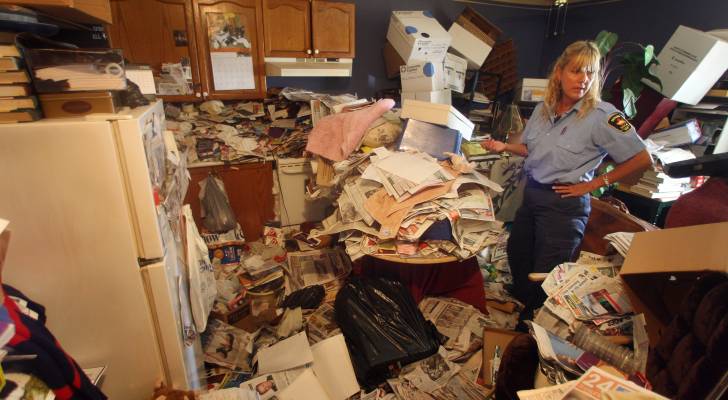
Laura’s 83-year-old mother is still sharp, stays active and pays her bills on time. But Laura no longer visits because her mother doesn’t want to host anyone in her “messy” condo.
The problem is, it’s more than a mess; her mom is a hoarder.
Don’t miss
- I’m 49 years old and have nothing saved for retirement — what should I do? Don’t panic. Here are 5 of the easiest ways you can catch up (and fast)
- Thanks to Jeff Bezos, you can now become a landlord for as little as $100 — and no, you don’t have to deal with tenants or fix freezers. Here’s how
- Gain potential quarterly income through this $1B private real estate fund — even if you’re not a millionaire. Here’s how to get started with as little as $10
Laura doesn’t know how to address the situation with her mother, but she’s worried. Cardboard boxes, old newspapers and piles of papers are a fire hazard, and rotting food and garbage could lead to mold or vermin. Those pose risks not only to her mother’s health, but to other tenants in the building.
But she’s also worried that if the condo board finds out — say, the neighbors start to notice a bad smell coming out of her mother’s unit — that social services could end up getting involved. Maybe she’d even get evicted.
Should Laura step in before someone else does?
The many risks of hoarding
Laura’s mother is far from alone. About 2% of Americans (and 6% of those over 70 years old) are compulsive hoarders.
Hoarding isn’t just living with clutter and mess; it’s a mental illness that can interfere with physical, emotional and even financial wellbeing.
Hoarding is defined as a “persistent difficulty discarding or parting with possessions, regardless of their actual value,” according to the Mental Health Academy. “The difficulty is due to a perceived need to save the items and to the distress associated with discarding them.”
Aside from making it difficult to perform everyday tasks, hoarding has potential health and safety risks (not to mention the risks of social isolation).
For example, it can be a fire hazard and lead to infestations, such as cockroaches, bedbugs or mice. Once pests take up residence, it can lead to health issues such as asthma and other respiratory conditions.
But it can also lead to financial risks. Some hoarders don’t pay their bills because they can’t find the paperwork. But they also risk eviction. While technically you can’t be kicked out of your home for being messy, a condo board could make a case for eviction if hoarding endangers other tenants or the property, or if it violates safety, fire or building codes.
“More tragically, those who hoard are more often subject to forced evictions, and if health authorities or environmental health officers become involved, the cost to the hoarding tenant may be considerable if the home is subject to a forced clearing-out,” according to the []Mental Health Academy](https://www.mentalhealthacademy.com.au/blog/hoarding-disorder-the-items-and-the-impact).
To top it off, if they’re evicted they may have a hard time finding another home, since they’d be unlikely to get a positive reference from their current landlord.
Read more: Want an extra $1,300,000 when you retire? Dave Ramsey says this 7-step plan ‘works every single time’ to kill debt, get rich in America — and that ‘anyone’ can do it
How to manage a hoarding situation
Laura could talk to her mother and offer to help her “declutter.” If her mom isn’t amenable to the idea, she may have to address the situation with the condo board — for the sake of her mother’s health and safety. If that’s the case, she may want to come up with a plan to address the issue in a timely fashion so the condo board doesn’t escalate it further.
The condo board will likely have a process in place for dealing with this type of scenario; usually, the tenant is given a certain period of time to clean their unit. If the tenant ignores this request, however, the condo board could file a petition to have the unit cleaned, which could be particularly distressing for a hoarder.
Laura may want to consult a therapist or even a professional organizer specializing in hoarding, who could help to create a more gradual — and compassionate — plan for decluttering.
Rather than focusing on the possibility of eviction, it may be more useful to focus on the hoarding behavior and what’s causing it. By offering support and resources — and by bringing in professional help — it could lead to a more sustainable solution.
After all, forcing someone to declutter without addressing the root cause means they’re likely to repeat the hoarding behavior.
What to read next
- Don’t have the cash to pay Uncle Sam in 2025? You may already be eligible for a ‘streamlined’ handshake with the IRS — here’s how it works and how it can potentially save you thousands
- Here are 5 ‘must have’ items that Americans (almost) always overpay for — and very quickly regret. How many are hurting you?
- Robert Kiyosaki warns of a ‘Greater Depression’ coming to the US — with millions of Americans going poor. But he says these 2 ‘easy-money’ assets will bring in great wealth. How to get in now
This article provides information only and should not be construed as advice. It is provided without warranty of any kind.


